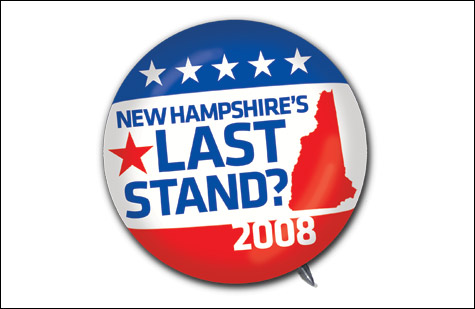This could be the last election in which the New Hampshire primary, and its quaintly irrelevant retail politics, really matters

|
|
Whatever happens in the future, New Hampshire’s place in American political history is secure. Here are some highlights from past Granite State primaries:
1952 Dwight Eisenhower uses his win in New Hampshire (then with a population of 536,000) to unseat Robert Taft as the preferred candidate of the GOP establishment.
1968 President Lyndon Johnson’s slim victory over Eugene McCarthy prompts the former’s withdrawal from the race, and Bobby Kennedy’s ill-fated entrance.
1972 Democratic front-runner Edmund Muskie appears to cry in speech outside the offices of the Manchester Union-Leader, which had attacked his wife in print — his campaign never recovers.
1976 Jimmy Carter’s Granite State victory transforms him from footnote to favorite.
1984 Gary Hart becomes the front-runner after beating Walter Mondale and rest of field. Mondale later rallies to nip Hart at the convention wire and earn the Democratic nomination (Donna Rice would take care of ’88).
1988 After finishing third in Iowa, George H.W. Bush rebounds with vital New Hampshire win.
1992 Bill Clinton packages his second-place finish as a victory with the “Comeback Kid” moniker, proceeds to the presidency.
2000 John McCain stuns George W. Bush, but can’t carry his momentum past South Carolina.
2004 After topping ex-favorite Howard Dean in Iowa, John Kerry rides his New Hampshire win to the nomination.
|
MANCHESTER, NH — In a few days, New Hampshire voters will take their quadrennial place at the center of American politics — and this time, the stakes will be even higher than usual. With no presumptive nominee from either party, the Granite State will help decide the fates of the first viable female and African-American candidates for president, as well as the outcome of a pitched battle for the soul of the GOP.
What probably won’t be mentioned, amid the flurry of pre- and post-election coverage, is that 2008 could be the last time New Hampshire enjoys this political privilege. Since griping about the New Hampshire primary is almost as much of a ritual as the New Hampshire primary itself, that may sound far-fetched. But this time around, the state’s primary primacy is truly endangered, though, for the nation’s political process, that may be a good thing.
Vote first or die
On a snowy night this past month, New Hampshire governor John Lynch took the stage inside Verizon Wireless Arena and waxed fulsome over TV deity Oprah Winfrey and Democratic senator Barack Obama, the stars of the evening’s political pepfest. His biggest applause line, though, came when he changed the subject and started talking up the New Hampshire primary. In the Granite State, Lynch proudly proclaimed, you have to meet the citizens face-to-face — a process that will make you a better candidate and (if you’re lucky) a better president.
That’s precisely the line of argument that helped save the New Hampshire primary’s early date after the last presidential election. Back in 2004 — after John Kerry guided the Democrats to their seventh defeat in 10 election cycles — the Democratic National Committee convened a special commission to explore revamping the nominating schedule. There was talk of creating a Western primary, or a rotating system of regional primaries, or of moving big states such as Florida or California or Michigan toward the front of the nominating process — changes aimed at targeting constituencies neglected by the current system (there aren’t many blacks in either New Hampshire or Iowa, nor Latinos, nor urbanites) and maybe even winning an election for once. Obviously, the DNC’s deliberations were party-specific. But it seemed likely that a major retooling would prompt the Republicans to make big changes of their own.
In the end, though, there wasn’t much of a shake-up at all. After Iowa and New Hampshire masterfully lobbied the party’s power brokers, and the DNC commission issued its modest recommendations, and would-be rivals such as Nevada and South Carolina were bought off with improved positions (caucuses on January 19 and primary on January 26, respectively) — the new nominating schedule for 2008 wasn’t all that different from the old one. Once again, Iowa went first, holding its caucuses on January 3. Once again, New Hampshire will go second, holding its primary this Tuesday, on January 8. And once again, the nomination will almost certainly be decided after the one-day bevy of elections known as Super Tuesday. This year, though, Super Tuesday will take place on February 5, nearly a month earlier than it did in 2004. And it’ll feature roughly twice as many states as it did last time around.
How, exactly, did two small states manage to fend off 48 potential rivals? Chalk it up to inertia, or fear of unintended consequences, or a genuine conviction that New Hampshire and Iowa work, or the fact that any new state(s) poised to bump off Iowa and New Hampshire would similarly incur the envy of their erstwhile allies. But also credit New Hampshire and Iowa for an almost pathological determination to take any steps necessary to maintain their privileged role. “This is their life,” says University of Virginia political scientist Larry Sabato. “They’ll hold their contests right after July 4 the year before the election if they have to — they don’t care, as long as they’re first.”